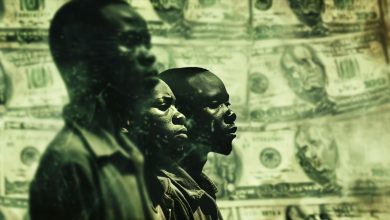Revisiting ‘Black on Both Sides’ — Mos Def’s 1999 debut album — 25 years later

Editor’s note: The following article is an op-ed, and the views expressed are the author’s own. Read more opinions on theGrio.
There are a few songs I vividly remember hearing (or seeing if the video was my introduction) for the first time. Outkast’s “Elevators (Me & U)” and Juvenile’s “Ha” immediately come to mind — both songs were so impactful to my life that I can even remember where I was when those songs became part of my existence. Black Star’s “Definition” is another one of those records. The video came on “Rap City” during the summer before my sophomore year of college in 1998, and while I was sitting on my couch, I instantly knew two things: 1) I was going to buy whatever album these two rappers, Mos Def (now Yasiin Bey) and Talib Kweli, released; and 2) Mos Def was a problem.
Some artists just have that thing, that intangible quality that makes it evident that you’re watching a star. Mos Def was one of those cats. From the opening bars, “From the first to the last of it, delivery is passionate, the whole and not the half of it, vocab and not the math of it …,” I felt like he was a rapper that I needed to know more about and wanted to hear more from. The debut album from Black Star, “Mos Def and Talib Kweli are Black Star,” released on Sept. 29, 1998 (the greatest release date in hip-hop history) did not disappoint. Both lyricists and producer Hi-Tek provided an album that was critically acclaimed. While I liked it, I didn’t love it, but it did keep me in wait for what I (and everybody else) knew at the time, there was no way that Mos Def wasn’t releasing an album soon. The streets requested it.
And then came the first single in the late summer of 1999, “Ms. Fat Booty.” Wait a minute, did Mos Def, the rapper who could do almost anything lyrically drop a record that was, simultaneously for the women and the men, flawlessly? Yes. Yes, he did. Have you ever heard a record that managed to check off every single box necessary at once? It had the beat, the rhymes, the life, the relatability and the ability to work on the dance floor. Mos released a single that became an instant classic and remains one to this day.
In 1999, that was the Mos Def experience. When “Black on Both Sides” dropped in October 1999 — October 12 to be exact — Mos somehow managed to release an album that was excessively Black, political, entertaining, rooted in real-life experiences, conspiratorial, reverential, angry, optimistic and prescient.
Lifestyle
The intro record, “Fear Not of Man,” which borrows both the title and beat from Fela Kuti’s 1977 song and album of the same name, opens with an observation and warning from Mos about the state of hip-hop, and Mos points out, simply, that whatever is going on with the people is what will be going on with hip-hop, words that ring truer in 2024 than I think even Mos expected 25 years ago. The music reflects the community and the environment even more so today with the advent of social media than it ever could in 1999.
“Black on Both Sides” is an album full of moments like this. So many of the records are still relevant in 2024. “Got” speaks about how easy it is to get robbed in the streets when you’re not paying attention, and unfortunately, that’s a lesson a lot of rappers still need to learn. “Mr. N*gga” is a reminder that no matter what you achieve in life, society still prefers to view Black people as less than whenever possible. “New World Water” is tailor-made for the conspiracy theorist in us all, and you know what, the internet has made conspiracy theories a part of regular life, except, many conspiracy theories end up not being that much of a reach.
The point is that Mos Def’s album, a classic by any definition of the word, is also amazingly relevant because Mos decided to focus on the human experience of being a Black person in America, and in some cases, use examples from everyday life to make it work. It takes on the appropriation of Black culture through music and rock ‘n’ roll specifically, and that’s a conversation we continue to have that has shown no sign of ending. Pop culture has borrowed from and outright stolen Black culture for profit and it’s been happening since Black art was able to be commodified. For sure, the topics on the album aren’t novel, but all in one place with such a clear manner of delivery over the right production — well, Mos Def is one of the few to create an artistic work that packed so much punch in one package.
Surprisingly, because of the samples and production choices made, the album doesn’t feel dated, either. Sure, there are markers that indicate the album isn’t new, but there is nary a mention of social media on the record. But somehow that doesn’t take away from the record’s impact. Just like most classic love songs leave out words and phrases that would date them, “Black on Both Sides” does this, and I feel like I could introduce a person to this album in 2024 and they might think it was new. That is a feat in and of itself. All while being Black on both sides, a nod to the phrase “give me five on the Black hand side.”
“Black on Both Sides” is timeless hip-hop. It’s mathematics.

Panama Jackson is a columnist at theGrio and host of the award-winning podcast, “Dear Culture” on theGrio Black Podcast Network. He writes very Black things, drinks very brown liquors, and is pretty fly for a light guy. His biggest accomplishment to date coincides with his Blackest accomplishment to date in that he received a phone call from Oprah Winfrey after she read one of his pieces (biggest) but he didn’t answer the phone because the caller ID said “Unknown” (Blackest).




